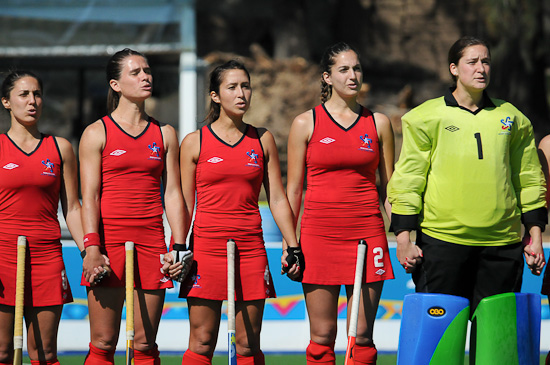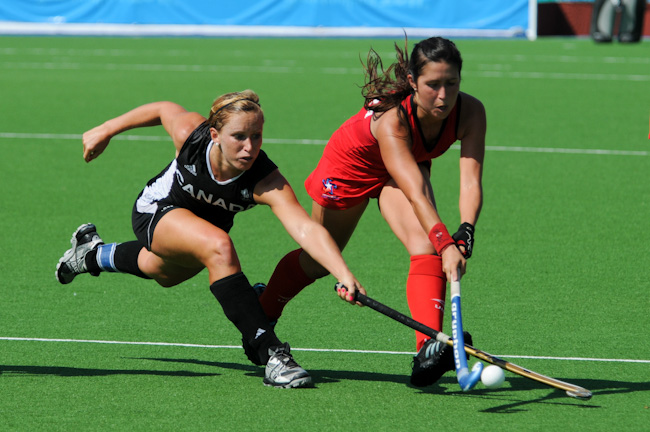
For some teams, such as Argentina and the USA, the players are able to devote themselves to life as a full-time athlete. The athletes are part of a centralized system and as such they train together, relax together and have opportunities to play top level competition on a regular basis.
For other teams within the Pan American Federation there is far less money in the coffers and so the coach and managers have to be clever with their resources. Players get together for intensive training camps and play opposition that is more local and so less expensive to travel to.
We talk to Javiera Villagra, a member of Chile national women’s team. The Chilean player has spent several seasons playing hockey in Spain and Germany and is one of the few players in the team who is a full-time athlete. She explains how Chile, who are ranked at 22 in the world, are preparing for the forthcoming Pan American Games, where they are hoping to do better than their bronze medal finish in 2011.
Question: How are Chile’s preparations for the Pan American games progressing?
Javiera Villagra: “We are having a very intense but entertaining preparation period for the upcoming Pan Am Games. Over the past couple of months we have played against Japan, South Africa, Italy and participated in the Hockey World League Two, where we got to compete against very strong teams.
“At the end of May we are travelling to Spain and Belgium to play against their respective national teams plus an extra match against Ireland. It is probably the best preparation we’ve ever had and therefore we are extremely motivated by our future goals.”
Qu: How much time does your squad spend training together?
JV: “Most of our players are based in and around Santiago, so we are lucky to be able to get most of our players training together on a daily basis. We have a combination of athletic and weight lifting training five times a week, plus two or three sessions of hockey. To that we add the training sessions and competitions from our clubs.”
Qu: How easy is it for your players to get time away from work to train?
JV: “Most of our players are students or are in full-time work, so we usually have our fitness sessions at seven am and then we have hockey in the late afternoons. We do not have the resources to dedicate ourselves fully to hockey and therefore we juggle our own personal responsibilities and accommodate them to the needs of the team. Whenever there is time, we plan some individual session to try and work on specifics for each player. However, as the tournament approaches we commit ourselves fully to the team and try and work on those small details that can make a difference.”
Qu: How would you rate Chile’s performance over the past year?
JV: “We’ve put in some very strong performances over the past 12 months. After our participation in World League Three in Rotterdam in 2013, we received several invitations from teams that were willing to play against us or to travel to us to play. That was the first recognition that we were doing things right. We have been constantly raising our standards, getting closer to better ranked teams and making a name for ourselves, but that does not mean that it has all been perfect along the way. We’ve had our downfalls; one of the toughest and most recent is not being able to qualify for the World League Three in Valencia, but we are not losing sight of our ultimate goal. Not playing this tournament (Hockey World League Three) meant missing out on top quality preparation for the Pan Am Gamess, but our staff was quick-thinking enough to get us on tour again and so we have been able to have an excellent preparation before the main event of the year for us.”
Qu: Have there been many changes to the team in the past two years?
JV: Over the past few years there have been a lot of long-time players that have retired and many new faces have stepped up. Even though it was a tough transition at the beginning, the young players have brought a fresh start and new energy to our program, which is something I believe is also reflected in our more aggressive style of game. Our coaching staff brought us a new style of hockey. Like I said, we are more aggressive. We dare to play our game against any opponent instead of waiting to see what they do and then reacting. That has given us a lot more confidence and has made us get closer to teams that are ranked higher than us.
Qu: Who do you feel are the main danger players in the other Pan Am teams?
JV: “It is difficult to pinpoint just a few players but I think what the USA has done over the past few years is simply impressive. I saw them play last year at the World Cup and they definitely deserved even more than a fourth place finish. For several years they have been second to Argentina and I only think that has made them a stronger team. They play with enormous ambition and certainly are one of the favorites to win the Pan American Games.
Chile will be facing USA in its second pool B match of the Pan American Games. Other teams competing in their pool are Cuba and Uruguay – both lower ranked than Chile, although Uruguay will be confident and match-sharp after making its first appearance at the Hockey World League Semi-Finals in Valencia.


